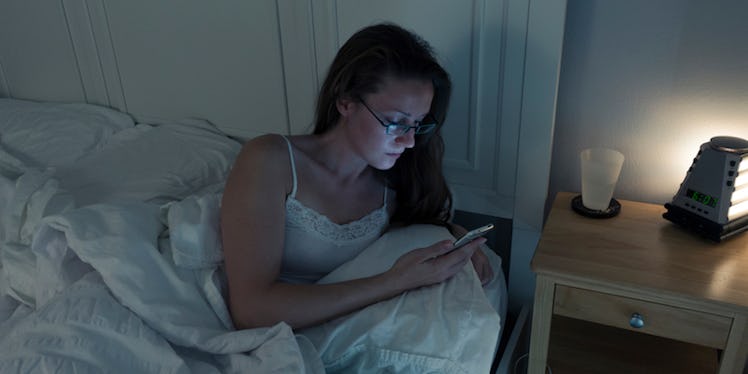
4 Ways To De-Stress When You're Anxious About Not Falling Asleep
The CDC published an alarming article on the state of sleep problems in the United States, finding over 35 percent of Americans regularly don't get enough sleep. This is causing a number of problems — increased risk of motor vehicle accidents, higher risk of heart disease, weight gain, depression and impaired social skills
The CDC has a valid point. However, warning people about their sleep problems rarely helps them. It turns out, people tend to have a harder time overcoming their sleep disorders if they focus on them too closely.
Don't obsess over getting eight hours a sleep a night.
Too many people obsess over sleep problems, which often makes them worse. And it seems their obsessions are often rooted in the misconception of needing eight hours of sleep every night.
A study from the University of California recently found there isn't any pressing reason for people to get over six-and-a-half hours of sleep a night.
Rather than counting the hours of sleep you receive every night, use your own body as a barometer.
Some people actually need less than eight hours a night, and they could only be making their sleep problems worse by going to bed earlier than necessary.
Professor Kevin Morgan, Director of the Clinical Sleep Research Unit and Loughborough University, advises people to listen to their own bodies, instead of desperately trying to get eight hours of sleep every night:
If you wake up feeling reasonably refreshed, generally function properly during the day and feel sleepy around bedtime, then you're probably getting enough sleep.
Rather than counting the hours of sleep you receive every night, use your own body as a barometer.
Do you feel well-rested after about six hours of sleep every night? If so, then that's probably all the sleep that you need.
There's no point in trying to force yourself to sleep longer, as the overall quality of your sleep might be lower.
Don't stress out over sleep deprivation.
If you are having trouble sleeping, obsessing about it only makes the problem worse. Here are some habits you need to avoid:
1. Don't “try” to fall asleep.
People with insomnia often stress themselves out about falling asleep. They view it as a difficult challenge that requires a lot of work. They may follow a variety of rituals, such as reading, meditating or taking sleeping medication.
While these measures can certainly help, they aren't always possible, and you may begin to condition your mind to believe you won't be fall asleep if you don't follow them.
It's better just to work on relaxing yourself and dimming the lights, rather than obsessing over falling asleep.
2. Stop looking at the clock.
When you look at the clock and see what time it is, you become more anxious about getting enough sleep. You start to realize how little sleep you are getting, which makes it that much harder to drift away.
When you look at the clock and see what time it is, you become more anxious about getting enough sleep.
3. Don't think sleep problems will ruin your life.
It's easy to think about all the ways not getting enough sleep can make your life more difficult, especially if you start worrying about the presentation you have to give your boss or the test you're taking the next day.
Remind yourself you can still function perfectly fine, even if you don't sleep perfectly. When you stop thinking of falling asleep as a hurdle you need to overcome, it becomes much easier to let yourself fall asleep.
4. View all rest as productive.
Don't think the time you spend in bed is wasted if you can't fall asleep. As long as you're resting peacefully in a dark room, you still will be rejuvenating your body and mind.
As long as you're resting peacefully in a dark room, you still will be rejuvenating your body.
Changing your mindset is the most important thing you need to do to get a good night's rest. If you are still having trouble, you may need to change your daily routine.
Overall, don't let chronic sleep problems ruin your life. Limiting your use of electronics at night, eating fewer grains and more fats and prioritizing your exercise routine are all simple lifestyle changes to make sure you're falling asleep, staying asleep and waking up feeling rested.